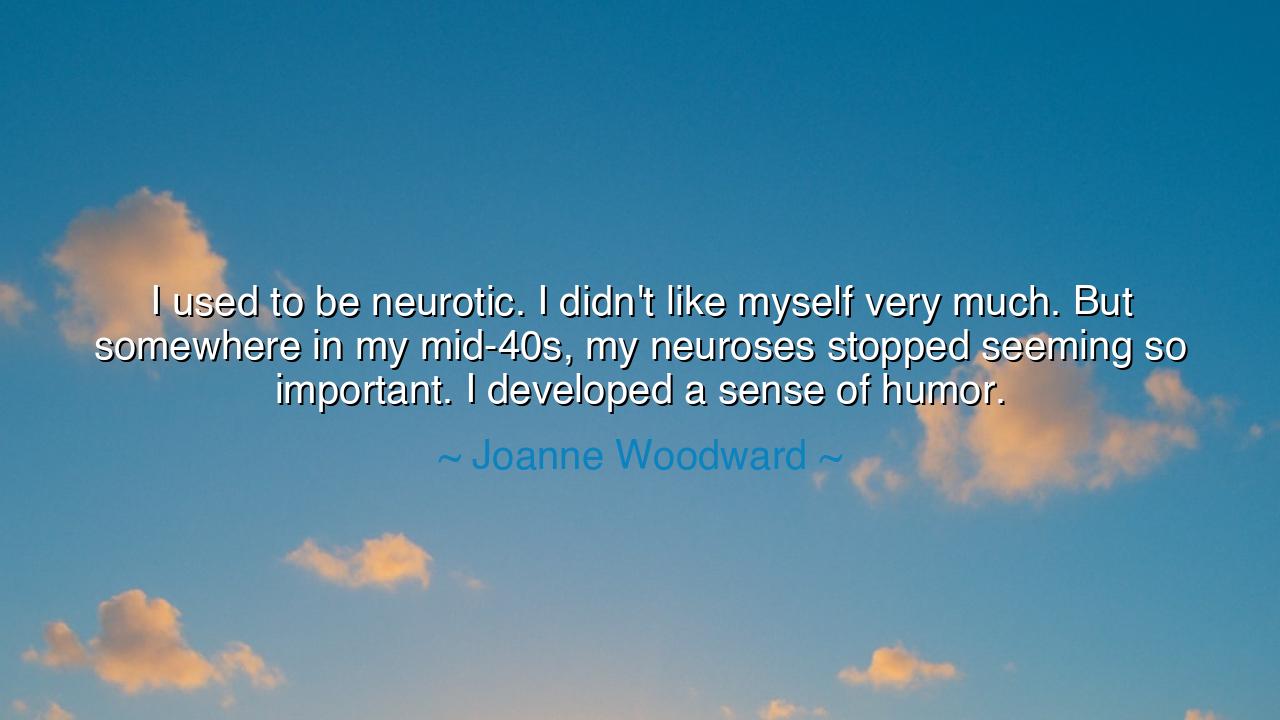
I used to be neurotic. I didn't like myself very much. But
I used to be neurotic. I didn't like myself very much. But somewhere in my mid-40s, my neuroses stopped seeming so important. I developed a sense of humor.






The words of Joanne Woodward carry the weight of a lifetime’s awakening: “I used to be neurotic. I didn’t like myself very much. But somewhere in my mid-40s, my neuroses stopped seeming so important. I developed a sense of humor.” In this simple reflection lies the story of the soul’s evolution — from self-criticism to self-compassion, from the tyranny of the anxious mind to the quiet sovereignty of laughter. It is the tale of a spirit that has walked through the storm of its own overthinking and emerged into sunlight, wiser, gentler, and free.
In the youth of our lives, many are seized by the chains of neurosis — that ceaseless turning of thought upon itself, that hunger for perfection, for approval, for control over the shifting winds of fate. The young soul, believing it can command all things, becomes exhausted by its own striving. But Woodward, in her mid-40s, found what the ancients knew to be the cure for this inner disease: humor, the light that dissolves the shadow of self-importance. When one laughs at their own fears, the fears lose their grip; when one smiles at their own flaws, the flaws lose their sting. Thus, in the fire of years, wisdom is born — not through victory, but through surrender.
The ancient Stoics spoke often of this transformation. Epictetus, once a slave, taught that “It is not things themselves that disturb us, but our judgments about them.” So too did Woodward discover that her torment did not come from the world, but from her own mind — the relentless whisper that said she was not enough. But when she learned to laugh, she broke that whisper’s power. In laughter, there is acceptance. It is not the cruel laughter of mockery, but the soft laughter of understanding — the laughter that says, “Ah, so this too is part of being human.” It is the laughter of freedom.
Consider the story of Leonardo da Vinci, whose genius was matched only by his self-doubt. He left many works unfinished, believing they were never good enough. Yet, as he aged, his notebooks began to fill not with anxious corrections, but with jokes, fables, and whimsical observations about life. It was as though he had discovered that perfection was an illusion, and that joy — not flawlessness — was the true mark of creation. Like Woodward, Leonardo learned that humor is the great reconciler between the striving of the mind and the acceptance of the heart.
There is a kind of heroism in this laughter — not loud or triumphant, but calm and enduring. To develop a sense of humor about one’s own flaws is to reclaim power over them. It is to say, “You no longer define me.” It is the moment when the warrior sheathes his sword and realizes that the true victory is inner peace. Woodward’s transformation is not merely personal; it is universal. It speaks to all who have ever been imprisoned by their own thoughts, all who have mistaken worry for worth, and seriousness for strength.
The lesson, then, is this: learn to laugh at yourself. For laughter is the balm that heals the wounds of pride and fear. When your mind tells you that you are not enough, answer it with a smile. When you stumble, let your laughter rise like morning sun over the ruins of yesterday’s anxieties. Practice humility, for humor and humility walk hand in hand. Each day, find one small absurdity in your life and bless it with amusement — the spilled drink, the forgotten word, the awkward silence — for these, too, are the threads that make the tapestry of your being.
And so, dear listener, carry this truth within you: to be neurotic is to be human, but to laugh at your neurosis is to be free. Life will never cease to bring uncertainty, but you need not meet it with fear. Meet it with humor. Meet it with grace. Like Joanne Woodward, allow the passage of time to teach you not to escape your imperfections, but to dance with them. For in that dance — that light, joyful, forgiving laughter — the soul finds its true serenity.
Thus, let this wisdom be handed down: do not take yourself too seriously. The world is vast, the years are few, and laughter is the bridge between sorrow and peace. Cherish it, practice it, and share it — for the one who can laugh, even in the face of their own folly, has already conquered the darkest parts of themselves.






AAdministratorAdministrator
Welcome, honored guests. Please leave a comment, we will respond soon